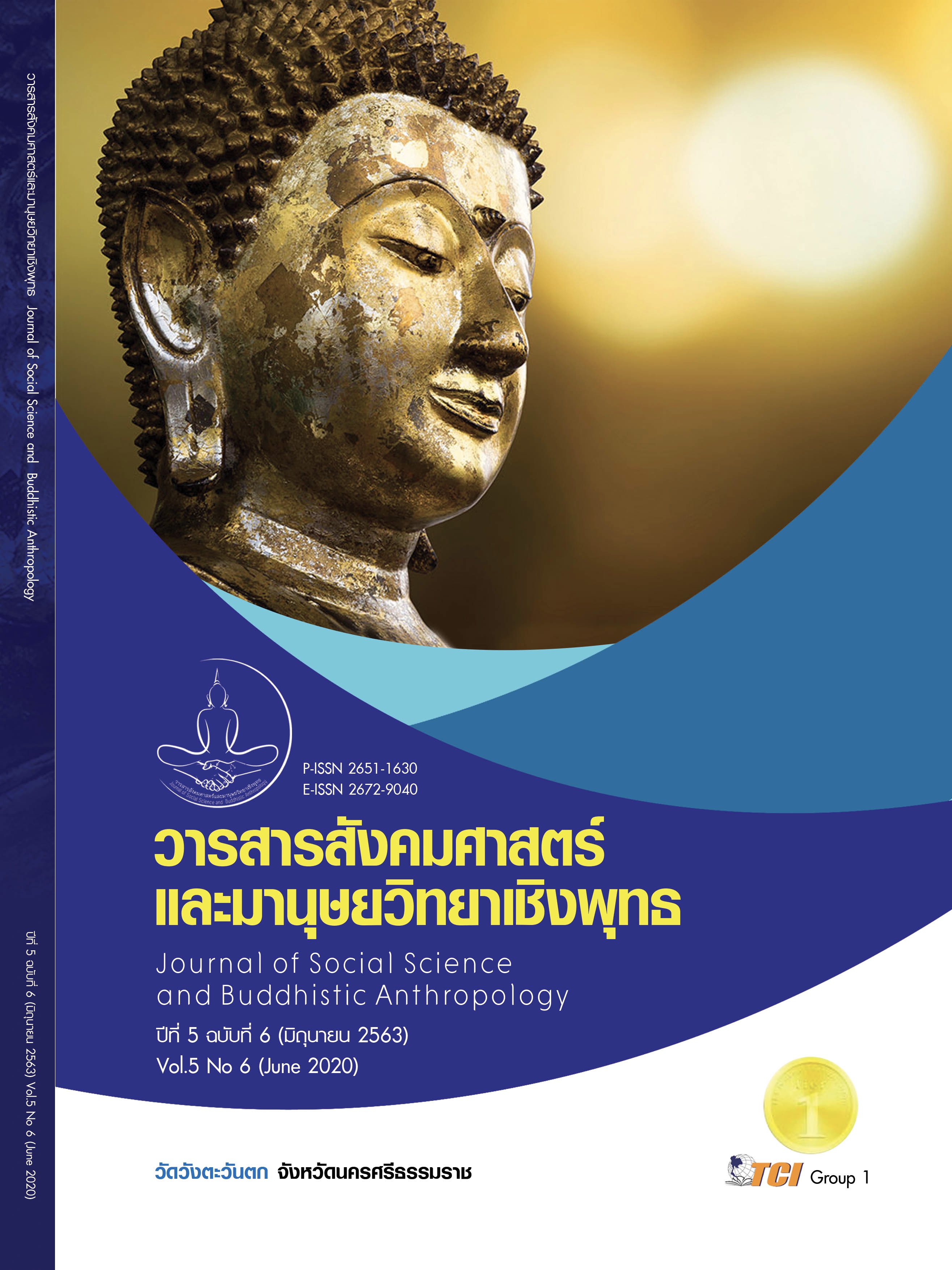THE PROCESS OF EMPOWERMENT BY BUDDHIST PSYCHOLOGY FOR HEALTH BEHAVIOR CHANGES
Keywords:
Buddhist psychological, Vipassana-Kammatthana (meditation) by Four Foundations of Mindfulness, Empowerment, Monks Health BehaviorAbstract
The purposes of this study were: 1) to study Buddhist concepts and theories about psychology and contemporary psychology 2) to develop the conceptual framework for the empowerment process in Buddhist psychology and 3) to verify the validity of the Buddhist psychological empowerment process. This study was mixed method research such as quantitative by using simple random sampling questionnaires. The sample was selected from sick monk who came to receive treatment services at outpatient department of Priest Hospital by total of 250 persons and also using statistical, frequency, percentage, mean and Pearson's correlation coefficient, standard deviation, chi-square methods and qualitative were used in the semi - structured interview with specific sampling. A main sample was selected from representatives who have knowledge and experience about Vipassana - Kammatthana (meditation) practice, psychology and treatment for the priest that divided into 3 groups such as 1) Buddhism 2) psychology and 3) Priest Hospital team , the total of 11 person. The data was analysis on content and summaries on the overview. Results of the study were as follows: 1) The concepts and theories such as 1.1 Vipassana-Kammatthana (meditation) practice 1.2 empowerment 1.3 supporting factors and 1.4 appropriate health behaviors for the ill monks. 2. Creating a process of empowerment in Buddhist psychology by 2 variables such as 1) internal variable such as Vipassana-Kammatthana (meditation) practice and empowerment, and 2) external variable such as supporting factors and behaviors of ill monks that found 348.79 chi-square, the degrees of freedom are 84 and the probability (p) is .000. 3. To verify the validity of the Buddhist psychological empowerment process means four foundations of mindfulness (Satipahna) and supporting factors found the influence with .28 and .29 with statistical significance at the level of .01 and monks health behavior found directly influenced by empowerment and supporting factors Influences with .38 and .40 with statistical significance at the .01 level.
References
กระทรวงสาธารณสุข. (2562). การตรวจคัดกรองสุขภาพพระสงฆ์. เรียกใช้เมื่อ 28 พฤษภาคม 2562 จาก www.moph.go.thopsiprg/module.php?Mod= news_print&idHot
คณะกรรมการบริหารโรงพยาบาลสงฆ์. (2562). รายงานประจำปี โรงพยาบาลสงฆ์. กรุงเทพมหานคร: โรงพยาบาลสงฆ์.
ทีมข่าวศาสนา. (2562). มหาเถรสมาคมประกาศขับเคลื่อน ธรรมนูญสุขภาพพระสงฆ์ แห่งชาติ พ.ศ. 2560. เรียกใช้เมื่อ 20 เมษายน 2562 จาก https://www.thairath.co.th/news /local /1340087
นิภาพรรณ อธิคมานนท์. (2554). ผลของโปรแกรมส่งเสริมสุขภาพสำหรับผู้สูงอายุในชมรมผู้สูงอายุอำเภอบางปะหัน จังหวัดพระนครศรีอยุธยา. ใน วิทยานิพนธ์สาธารณสุข ศาสตรมหาบัณฑิต สาขาสาธารณสุขศาสตร์. มหาวิทยาลัยบูรพา.
บุญชม ศรีสะอาด. (2545). วิธีการทางสถิติสำหรับการวิจัย เล่ม 2. กรุงเทพมหานคร: สุวีริยาการพิมพ์.
พระมนตรี อาภทฺธโร (คนทรงแสน). (2560). การเจริญสติปัฏฐาน 4 กับการพัฒนาปัญญาญาณ ตามหลักปฏิบัติวิปัสสนากรรมฐานของพระธรรมธีรราชมหามุนี (โชดก ญาณสิทฺธิ). ใน วิทยานิพนธ์พุทธศาสตรมหาบัณฑิต สาขาวิชาพระพุทธศาสนา. มหาวิทยาลัยมหาจุฬาลงกรณราชวิทยาลัย.
พลกฤษณ์ โชติศิริรัตน์. (2554). การศึกษาเชิงวิเคราะห์การรักษาโรคด้วยวิปัสสนากัมมัฏฐานตามแนวทางของพระธรรมสิงหบุราจารย์ (จรัญ ฐิตธมฺโม). ใน วิทยานิพนธ์พุทธศาสตรมหาบัณฑิต สาขาวิชพระพุทธศาสนา. มหาจุฬาลงกรณราชวิทยาลัย.
มติชน. (2562). สาธารณสุขเผย 3 โรคเรื้อรังในพระสงฆ์ ‘ความดัน - ไขมัน - เบาหวาน’. เรียกใช้เมื่อ 20 พฤศจิกายน 2562 จาก https://www.matichon.co.th/local/ quality-life/news_1368979
ศศิกานต์ ศรีมณี และคณะ. (2561). ปัจจัยที่มีความสัมพันธ์ต่อพฤติกรรมการบริโภคอาหารของพระภิกษุสงฆ์ และพฤติกรรมถวายภัตตาหารของประชาชนในเขตภาษีเจริญ. ใน รายงานการวิจัย. มหาวิทยาลัยสยาม.
สุชาติ ประสิทธิ์รัฐสินธุ์. (2546). ระเบียบวิธีการวิจัยทางสังคมศาสตร์. กรุงเทพมหานคร: บริษัทเฟื่องฟ้า พริ้นติ้ง จำกัด.
Cronbach L J. (1990). Essentials of psychological testing. New York: Publishers.
Gibson, C.H. (1995). The process of empowerment in mothers of chronically ill children. Journal of Advanced Nursing, 21(1), 201 - 212.
Krejcie, R.V. & Morgan, D.W. (1970). Determining sample size for research activities. Educational and Psychological Measurement, 30(3), 607 - 610.









